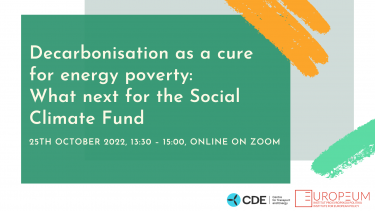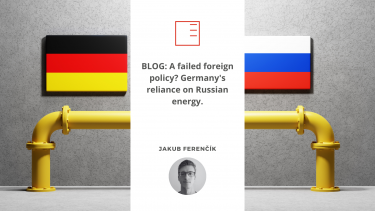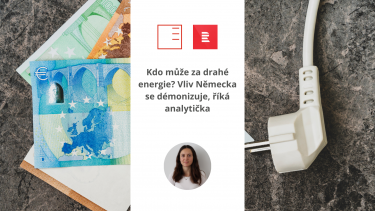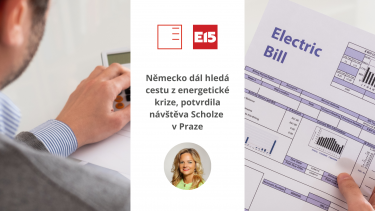POZVÁNKA: Decarbonisation as a cure for energy poverty: What next for the Social Climate Fund
Rádi bychom Vás pozvali ke kulatému stolu na téma " Decarbonisation as a cure for energy poverty: What next for the Social Climate Fund", který se bude konat 25th October 2022, 13:30 – 15:00, online on Zoom. Organizátory události jsou Centrum pro dopravu a energetiku a Institut pro evropskou politiku EUROPEUM.
Show more
BLOG: A failed foreign policy? Germany's reliance on Russian energy.
Jakub Ferenčík has written a blog on German dependence on Russian gas. In his post he discusses how the German government's initially positive intention to tie Russia to Europe through economic intergation for political stability has backfired and resulted in the opposite. It mentions the role of former Chancellor Gerhard Schröder, who contributed significantly to Germany's dependence on Russian supplies, and the circumstances surrounding the construction of the Nord Stream 2 pipeline. The second part analyses the legacy of former Chancellor Merkel and her failure to perceive Russian expansionist tendencies.
Show more
BLOG: A failed foreign policy? Germany's reliance on Russian energy.
Jakub Ferenčík napsal blog na téma německé závislosti na ruském plynu. V příspěvku rozebírá, že původně pozitivní záměr německé vlády, tedy skrze ekonomickou integraci připoutat Rusko k Evropě za účelem politické stability, se Evropě vymstil a vyústil v pravý opak. Zmiňuje roli bývalého kancléře Gerharda Schrödera, který výrazně přispěl k německé závislosti na dodávkách z Ruska, a okolnosti spojené s výstavbou plynovodu Nord Stream 2. V druhé části pak analyzuje odkaz bývalé kancléřky Merkelové a její selhání vnímat ruské expanzionistické tendence.
Show more
ČRo Radiožurnál: Who is to blame for expensive energy? Germany's influence is being demonised, says analyst
At an emergency meeting of EU ministers called by the Czech Republic, ministers came up with proposals on how to tackle rising energy prices in the EU. The meeting was an important demonstration of European unity, says our senior research fellow Kateřina Davidová. At the same time, Davidová points to the overestimated and often demonised impact of Germany's nuclear exit on the energy situation.
Show more
E15: Germany continues to look for a way out of the energy crisis, confirms Scholz's visit to Prague
Tereza Novotná, an associate research fellow at our Institute, has provided a commentary for the E15 portal. In the article, she discusses the visit of German Chancellor Olaf Scholz to Prague and the energy crisis that threatens the EU. According to Novotná, responsibility also lies with other countries, including the Czech Republic, which also failed to develop other energy sources in time.
Show more
E15 | The Germans are preparing for a harsh winter. But the core will only be at the mercy of a temporary
Our research fellow Michal Hrubý commented for the news server E15.cz on the German government's preparations for energy shortages during the coming winter. He also comments on Germany's temporary return to nuclear power.
Show moreRTVS: Some EU countries are returning to coal energy
The return of coal as a source of electricity production is a direct consequence of the Russian aggression in Ukraine. The resumption of coal-fired power stations in Europe means an increase in harmful emissions, jeopardizing the EU's climate targets. EUROPEUM Institute researcher Kateřina Davidová spoke in detail about the energy crisis in Europe, the measures that Brussels is taking to prevent countries from turning to sources of electricity such as coal, and the compensatory measures taken by member states.
Show more
E15.cz: Rescuing Uniper will cost Germany as much as two gigafactories. But experts say it is necessary
German energy giant Uniper is teetering on the brink of bankruptcy and there is not much time left to save it. A key moment is due this Thursday, when it will become clear whether or not Moscow will resume suspended gas supplies to Germany. Our researcher Michal Hrubý commented on this situation for E15.cz.
Show moreEU MONITOR: Recharging the Czech EU Presidency
Czechia will enter its second round of the EU Presidency on the 1st of July. Despite the ongoing major shift toward e-mobility across the EU, no strong commitments are coming from the Czech government. The widely accepted milestone of 2035 for phasing-out the sales of new non-zero-emission cars is still perceived by many local policy-makers as unrealistic. Michal Hrubý, a research fellow at the Institute for European Policy, writes in his EU Monitor.
Show more PDF
EU MONITOR: Recharging the Czech EU Presidency
Česko vstoupí 1. července do druhého kola předsednictví EU. Navzdory probíhajícímu významnému posunu směrem k e-mobilitě v celé EU nepřicházejí ze strany české vlády žádné silné závazky. Všeobecně přijímaný milník pro postupné ukončení prodeje nových automobilů s nenulovými emisemi do roku 2035 je mnoha místními politiky stále vnímán jako nereálný. Píše Michal Hrubý, výzkumný pracovník Insititutu pro evropskou politiku EUROPEUM ve svém EU Monitoru.
Show more PDF
Staroměstské náměstí 4/1
Prague 1 - Staré Město
110 00
tel.: +420 212 246 552
email: europeum@europeum.org
https://www.europeum.org







